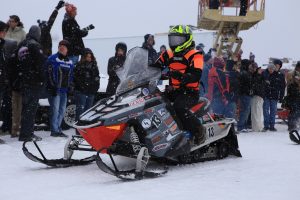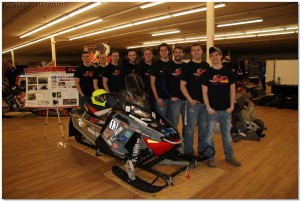 While most Iowa State students waited anxiously for the arrival of warmer weather, one student organization spent the first week of March surrounded by snow in Houghton, Michigan. The Iowa State Clean Snowmobile Challenge Team took part in their inaugural competitive event earlier this month, the 2015 SAE International Clean Snowmobile Challenge Competition. A total of 21 collegiate teams participated, comprising two diesel snowmobiles, six zero-emissions (battery-powered) snowmobiles and 13 internal combustion spark-ignited snowmobiles. Iowa State’s team finished 8th overall in the internal combustion spark-ignited class, and received the rookie of the year award.
While most Iowa State students waited anxiously for the arrival of warmer weather, one student organization spent the first week of March surrounded by snow in Houghton, Michigan. The Iowa State Clean Snowmobile Challenge Team took part in their inaugural competitive event earlier this month, the 2015 SAE International Clean Snowmobile Challenge Competition. A total of 21 collegiate teams participated, comprising two diesel snowmobiles, six zero-emissions (battery-powered) snowmobiles and 13 internal combustion spark-ignited snowmobiles. Iowa State’s team finished 8th overall in the internal combustion spark-ignited class, and received the rookie of the year award.
The Clean Snowmobile Challenge Team works to expand on classroom education through the design, modification and fabrication of a stock snowmobile, as well as the management of a student-led competitive team. CSC President and senior in mechanical engineering Dan Clemens said he got involved with the team because it was both practical and fun. “Snowmobiling and power sports in general are extremely fun, however they are notorious for harming the environment. I think it is great to get exposure to this industry, especially in a way that promotes the sustainability of the sport of snowmobiling,” Clemens said.
 The team began with a 2014 Indy 800 SP snowmobile donated by Polaris Industries. Extensive adjustments were made to get the sled into working order and make other donated parts compatible with the 2014 chassis. Other modifications, like wiring a tether kill switch, changing hoses and fittings, and designing and fabricating a new rear snow flap, were made in order to meet technical requirements.
The team began with a 2014 Indy 800 SP snowmobile donated by Polaris Industries. Extensive adjustments were made to get the sled into working order and make other donated parts compatible with the 2014 chassis. Other modifications, like wiring a tether kill switch, changing hoses and fittings, and designing and fabricating a new rear snow flap, were made in order to meet technical requirements.
Once the highest-priority changes were done, team members could work on their own design and modification ideas. These included the installation of sound-deadening material in the engine bay and new snow flap, as well as tuning the engine and modifying the fuel map to be able to efficiently run the isobutanol-gasoline mixture required at the competition. The team, composed mostly of mechanical engineers, faced challenges in the extensive electrical work required to run a flex-fuel sensor in the snowmobile.
Clemens said the team was pleased to pass the technical inspection on their first attempt, and be able to finish every event, including a 100 mile endurance race and 25-30 minute dynamometer test. “There is a fairly significant amount of preparation that needs to be completed just to get your modified snowmobile through the rigorous technical inspection, especially with a newly donated snowmobile,” Clemens said. “Our team really wanted to get a firsthand experience of the competition in order to contend better next year.”
The team’s preparation paid off not just in awards, but in experience. “The team was pleasantly surprised on our overall performance. One of the best parts of the competition was the collaboration that happened between all of the teams there. The experienced teams were always willing to lend a hand or give advice when you asked. It was a great learning atmosphere with tons of encouragement from all of the judges, volunteers, staff, and other schools,” Clemens said.
Clemens said the team will use lessons learned at this year’s competition to refine their snowmobile next year. Changes will likely include the addition of a catalyst, further engine tuning, and several “out-of-the-box” ideas. Next year, the team plans to take part in events like Saylorville Dam Snowmobile Club’s Grass Drags and the Winter Games in Okoboji.